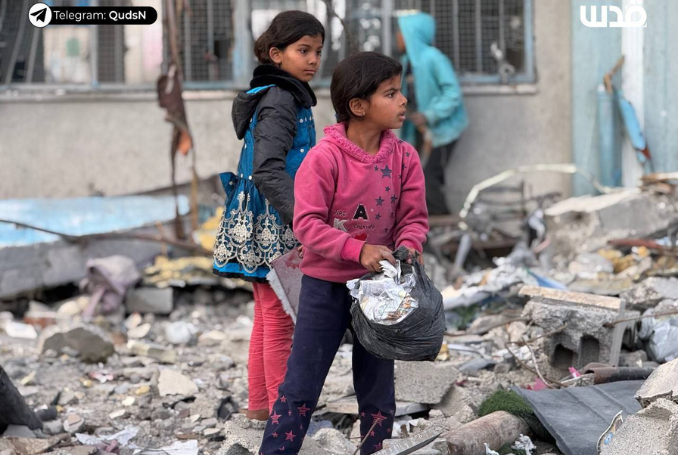
Meeting a week after a ceasefire paused the war in Gaza, after it raged for almost 470 days, the Security Council discussed the plight of children, with speakers calling for their needs to be prioritized, through the rebuilding of educational infrastructure, the provision of psychosocial support and ensuring a surge of humanitarian aid to the Strip.
“A generation has been traumatized,” Tom Fletcher, Under-Secretary-General for Humanitarian Affairs and Emergency Relief Coordinator, told the Council, pointing to the United Nations Children’s Fund (UNICEF) finding that 1 million children need mental health and psychosocial support for depression, anxiety and suicidal thoughts.
Nonetheless, today’s briefing marks “one of the rare times we are able to highlight positive developments”, he said, with the ceasefire providing a reprieve from relentless hostilities for Palestinians; allowing Israeli hostages and imprisoned Palestinians to be reunited with their families; and allowing a surge in life-saving humanitarian aid into Gaza. “Children have been killed, starved and frozen to death,” he said, adding:
“Some died before their first breath — perishing with their mothers in childbirth.” Citing conservative estimates indicating that over 17,000 children are without their families in Gaza, he stated that an estimated 150,000 pregnant women and new mothers are now in desperate need of health services.
Outlining the UN and its partners’ stepped-up response across the Gaza Strip in recent days to meet the needs of 2 million people across Gaza, he said they were enabled by improved operating conditions, including safe, unobstructed humanitarian access, the absence of hostilities and the almost complete cessation of criminal looting.
Such operations included the provision of life-saving services; delivering food parcels and flour and working to reopen bakeries; and distributing fuel to ensure that critical services, such as healthcare and water pumping, can run on back-up generators, he said, underscoring: “At the centre of this, as always, is United Nations Relief and Works Agency for Palestine Refugees in the Near East (UNRWA).”
He went on to express alarm over the situation in the West Bank, where record-high levels of casualties, displacement and access restrictions witnessed since October 2023 have intensified since the announcement of the ceasefire. Voicing alarm over attacks by Israeli settlers on Palestinian villages and an ongoing military operation in Jenin causing death and displacement, he urged the Council to ensure the ceasefire is maintained and to ensure that international law is respected across the Occupied Palestinian Territory of Gaza and the West Bank, including East Jerusalem.
Restrictions on critical humanitarian items must be lifted, including items considered to be “dual use”, and there must be accountability for atrocities. Underscoring the need to ensure humanitarian operations are well-funded, with the 2025 Flash Appeal in need of $4.07 billion to meet the needs of 3 million people in Gaza and the West Bank, he stressed: “The children of Gaza are not collateral damage”, but deserving of security, education and hope. “They tell us that the world was not there for them through this war. We must be there for them now.”
The Council also heard from Bisan Nateel, from Tamer Institute for Community Education, an organization that helps Palestinian children express themselves through artistic activities, who recounted the “very simple dreams” expressed in drawings by the children she worked with, who “dreamed of going back to school, of playing with friends, and of not hearing constant shelling”.
Instead, she said, they were told to go to the safe place in south Gaza, through a “so-called safe corridor” where their lives were under threat, forced to see bodies along the road, forced to walk as snipers targeted them.
“They arrived unable to say a word about the horrific sights seen in their displacement journey, to a safe area that was targeted,” she said. Displaying a drawing by a child named Gazi when he was in al-Mawasi refugee camp, in which he drew himself feeling well-fed, at home with his father, she said: “But Gazi lost his life, along with his father, when their tent was attacked.”
Also citing the case of a 12-year-old girl in north Gaza, who saw the remains of relatives “torn to pieces” outside her tent, she said that amidst the horror and violence, the children of the Strip forgot “what it means to live, to be human”.
Throughout the conflict, she recalled awaiting news of Security Council meetings on the radio, hoping for a ceasefire that would end the massacres. “Every day we lost our friends, loved ones, our homes and lives,” she said, recalling the death of her friend Mohammed, alongside the children he was drawing and playing with at Al-Maamadani Hospital.
“We used to walk down the streets, not knowing if we would live or die, always waiting for the moment the Council would announce a ceasefire, and end the violations against the Palestinian people, including their right to life, violated during 470 days of continuous attack against Gaza,” she stressed. She voiced hope that Gazans’ “right to life” will he restored, and that children can go back to school, to play, to draw and to sing; to being “normal children in a normal environment, not surrounded by soldiers, and hearing weapons”. In Gaza, “we do not know how life looks like in the outside world,” she said, adding: “We have lost a lot in this war and I hope we will not lose more.”







